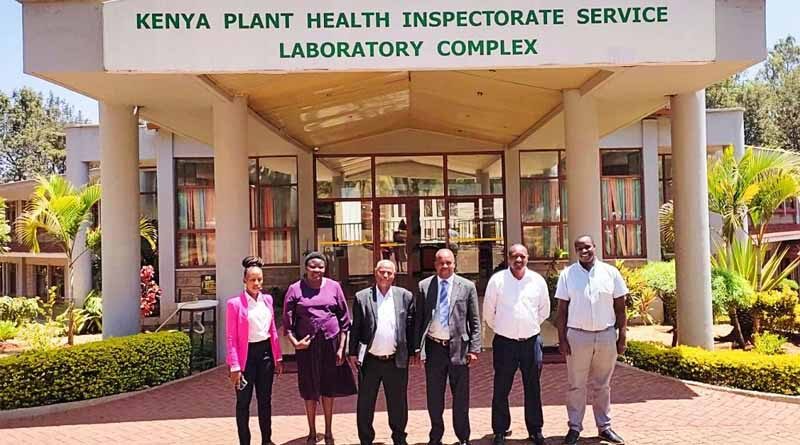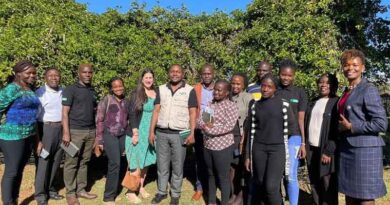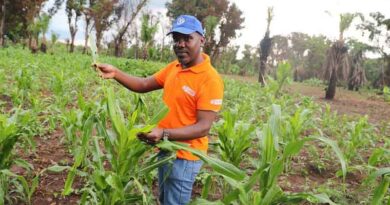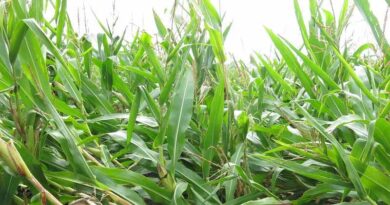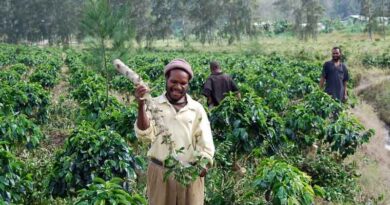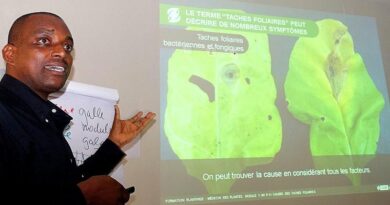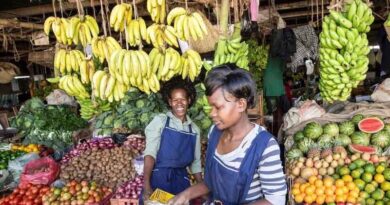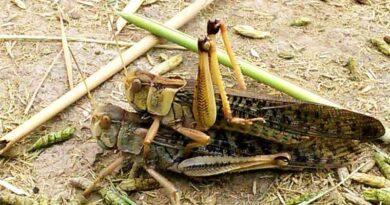Ethiopia’s Director of Plant Protection explores further collaboration with CABI
22 February 2023, Africa: Mr Belayneh Nigussie, Ethiopia’s Director of Plant Protection within its Ministry of Agriculture (MoA) and CABI Liaison Officer for Ethiopia, has paid a visit to CABI’s regional centre for Africa in Nairobi, Kenya, to explore further collaboration towards ensuring greater food security.
As part of the visit where Mr Nigussie was hosted and held talks with CABI’s Dr Dennis Rangi, Director General, Development, and Dr Morris Akiri, Senior Regional Director.
A tour was also facilitated by the Kenya Plant Health Inspectorate Service (KEPHIS) headquarters and the Kenya Agricultural and Livestock Research Organization (KALRO) – Muguga Centre, which hosts CABI’s biological control research and insect rearing activities.
In 2020, CABI welcomed Ethiopia as a Member Country and in doing so it enjoys a range of benefits including input into CABI’s global development agenda, links to its network of partners as well as regular consultations to address its needs.
Other benefits of membership with CABI that Ethiopia receives include voting rights at CABI Review Conferences and Executive Council meetings as well as access to CABI’s broad range of products, services, programmes and project deliveries and capacity-building activities.
At the time Mr Sani Redi Ahmed, the State Minister, Ministry of Agriculture, who had been championing for Ethiopia’s membership of CABI, said that the Government of Ethiopia is committed to maximising its potential to ensure greater food security for its citizens as well as extend its capabilities for export of key cash crops including coffee.
The country has recently had input into CABI’s new Medium-Term Strategy 2023-2025 which is working on some of the biggest challenges facing humanity – hunger, poverty, gender inequality, climate change and the loss of biodiversity.
It sets out what CABI plans to do in partnership, with its Member Countries including Ethiopia, in each of these challenges by pursuing five major goals that include improving the food security and livelihoods of smallholder communities.
This is while being mindful of a need to help communities adapt to the impacts of climate change and reducing the inequalities – by creating better opportunities – for rural women and youth in agriculture.
CABI has recently been working in partnership with Ethiopia to further build the capacity of its agricultural extension workers. Through the PlantwisePlus programme and complementary CDF funding, it has worked with the Ethiopia Institute of Agricultural Research to conduct pest risk analysis training to help farmers protect their crops from pests and diseases.
CABI has also been mapping the ferocious speed and probable cause of a devastating spread of the invasive alien tree Prosopis juliflora (Swartz DC) across the Afar Region of North Eastern Ethiopia.
This is a woody weed, first introduced in Ethiopia in the 1970s and 1980s, which causes significant environmental impacts and is a source of conflict among pastoralist groups due to the effect on dwindling grazing land.
Dr Rangi said, “Ethiopia – being the seat of the African Union and the United Nations Economic Commission for Africa – is a very important Member Country for CABI.
“It is playing a significant role in helping CABI to deliver its strategy to help smallholder farmers produce healthier and more profitable crops sustainably while recognising the role of women and youth.
“The visit of Mr Nigussie was an excellent opportunity to outline an action plan for our future collaboration with Ethiopia that includes ways in which they will further benefit from Membership and our strategic goals over the next two to three years.”
Dr Akiri said, “In addition to extending Ethiopia the full complement of membership benefits, CABI has been engaged to further strengthen the food security situation in Ethiopia through the creation of a Data Sharing Toolkit which provides better access to information on soil health, agronomy and fertilizers in the country.
“Through this and other initiatives, we continue to demonstrate our commitment to improving the livelihoods of small-holder farmers in the country by providing science-based, practical solutions while sharing our broad expertise with our partners.”
The resource, which was made possible thanks to funding from the Bill & Melinda Gates Foundation (BMGF), aims to equip development practitioners (Foundation programme officers, their grantees, partners and other donors) with the necessary skills to develop better grants that will foster more access to agricultural data.
Mr Nigussie said, “Ethiopia values its membership with CABI tremendously and has ensured that its fees are up to date amid the other financial priority our country faces.
“As a landlocked country with a long border with Kenya, we are somewhat susceptible to the arrival of invasive species which not only threaten our agricultural production but also our biodiversity and ecosystems.
“In recent years we have identified 10 new different invasive species and plant pests that were introduced into the country alone. We look forward to continuing our work with CABI to prioritise and mitigate those threats which may impinge upon our ability to be more food secure and protect our environment.”
Also Read: Best Agrolife launches 8 new formulations
(For Latest Agriculture News & Updates, follow Krishak Jagat on Google News)

